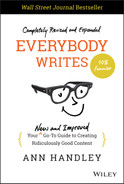Part I
Writing Rules: How to Write Better (and How to Hate Writing Less)
There is no one single way to write—just as there is no one way to parent a child or roast a turkey. But there are truly terrible ways to do all three. And truly inspired ways, too.
With each—the writing, the roasting, the parenting—you need a basic understanding of the process before you begin. I'm going to assume you have that—you know enough to buy an oven and find a pan before you begin to roast anything, for example.
In other words, this book assumes that you are equipped with some fundamentals: a working knowledge of English (that means basic levels of grammar, spelling, usage, and punctuation).
(And I mean very basic: if you recognize that this is a sentence and not … I don't know … a rhinoceros … we're good! You can safely proceed, knowing you aren't out of your depth.)
This book also assumes—hopes!—that you come with some gung ho. An eagerness to become a better writer. That you know it matters. And you've kicked to the curb the dumb notion that only a gifted few have what it takes.
Author Ta-Nehisi Coates spent a year teaching writing to MIT students. He later noticed how the rigors of math had better prepared his kids for the rigors of writing, even if they didn't immediately see it that way.
“One of my students insisted that whereas in math you could practice and get better, in writing you either ‘had it’ or you didn't. I told her that writing was more like math than she suspected,” he wrote.1
You can learn to be a better writer—the same way you can learn algebra or Excel formulas or playing the ukulele. You need only a little knowledge, a lot of consistent effort, and good habits. (A framework or two can help, too.)
Here in Part I is everything I know about writing so far: everything I've learned intentionally and discovered by accident over decades of writing and editing professionally (and a lifetime of writing for the fun of it).
It's all here, mashed and distilled into what you need to know to be a better, more creative, more confident writer … slid down the bar directly into your hands. (Salut!)
If you have never written—if you are an “adult-onset writer” recovering from some trauma that made you feel like a hopeless writer—this section offers some processes and structures to help you get started.
If you've been writing for a while but feel stuck, here is some collected wisdom that will unstick you.
And if you are an experienced writer, I hope you rediscover the glee and joy of honing your craft. One of the things I like about writing is that you're never “done” improving. (That's why you're now reading a new edition of this book, which is so different from the first that it should be titled Everybody Rewrites!)
One final thing: I named this first section Writing Rules because I want to give you useful and memorable how-tos. I also want to differentiate these ideas from the general motivational aphorisms that pass for most writing advice. (Those aphorisms can be motivating. But they're frustratingly nonspecific.)
Think of these writing rules as more functional tools and less prescriptive rules: less hard-and-fast writing laws, more handy set of guidelines.
As bumpers on a bowling lane that nudge the ball away from the gutter, upping the odds that you will (BOOM!) score a strike.
Of course, you can break the rules (or ignore the tools). Isn't every rule made to be broken? Doesn't every rule have an exception?
Maybe you're a kind of confident content MacGyver who crafts superb social posts out of a metaphorical paper clip and roll of Scotch tape, improvising your own way.
Excellent! Good to hear! But to have gotten there, you've had to know what rules to break (or what tools to ignore).
Said another way by Pablo Picasso, the Dalai Lama, or that one guy on Twitter (no one really knows for sure):
Learn the rules like a pro, so you can break them like an artist.
Note
- 1. Ta-Nehisi Coates, “Notes From the First Year: Some Thoughts on Teaching at MIT,” The Atlantic, June 11, 2013, https://www.theatlantic.com/national/archive/2013/06/notes-from-the-first-year-some-thoughts-on-teaching-at-mit/276743/
